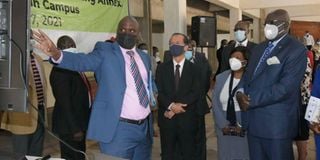Premium
Send fees defaulters home, George Magoha tells headteachers

Education CS George Magoha (right) and other officials during the launch of the multimillion-shilling Agricultural Laboratory (ALB) building at Jomo Kenyatta University of Agriculture and Technology yesterday.
There will be no more free schooling for learners with fees balances, Education Secretary George Magoha directed yesterday.
Just a day after returning to school from the half-term break, learners who have fees balances will be sent home, in a departure from the Jubilee administration’s policy of ensuring free primary and secondary education in public institutions.
Prof Magoha uncharacteristically gave principals and head teachers an express go-ahead to send home learners with school fees balances following complaints by the administrators that schools are broke and unable to run effectively.
Prof Magoha, who always protects learners from being sent home for not having paid school fees, blamed parents for failing to meet their obligations.
“A majority of the parents who are not paying fees can afford to pay fees. My exemption is that the headteachers and principals will double-check to ensure that the child they are sending home is not from a very poor family or a family that has lost a job.
Pay fees
“The majority of the people who are refusing to pay fees can afford to pay and they must now pay. Many people are taking advantage (of the Covid-19 economic effects to escape from paying school fees),” said Prof Magoha.
He spoke yesterday when he officiated at the handing over of an agriculture laboratory built through funding by the Japanese government at the Jomo Kenyatta University of Agriculture and Technology in Juja , Kiambu County.
He was accompanied by the Japanese ambassador to Kenya Horie Ryoichi and the vice chancellor of the university, Prof Victoria Ngumi.
The laboratory was funded through the Japan International Cooperation Agency (JICA) at a cost of Sh70 million.
Prof Magoha added that the ministry has released Sh2.8 billion and Sh6.5 billion for primary and secondary schools, which was the due capitation balance.
Schools are in the third term of the reorganised calendar that will run until July 16, 2023.
There are four terms this year that have been squeezed to make up for the time lost last year during the months-long closure.
Parents will pay fees again when the 2021 academic year begins on July 26, 2021 and again on October 4, 2021 at the beginning of the second term.
Last week, principals complained that school operations have been crippled by millions of shillings owed in unpaid fees. They, in turn, have incurred huge debts in unpaid bills to suppliers.
“Parents must take their responsibility seriously and clear the pending fees balances to ensure smooth running of schools,” Kahi Indimuli, the chair of the Kenya Secondary Schools Heads Association said.
Previously, schools used to withhold students’ certificates until they paid up fees balances but the government later ordered that all school leavers should be given their certificates, leaving principals with huge unpaid fees.
Prof Magoha revealed that the Form One selection exercise is ongoing and that the ministry will make an announcement regarding the same on or before June 15 2021.
“We have ensured absolute fairness, especially for the intelligent but poor students from slums,” he indicated.
Prof Ngumi said that the new facility has three fully equipped modern laboratories, six postgraduate lecture halls and administrative offices.
She noted that the facility will improve teaching and learning as well as boost the university research capacity especially in the agriculture and natural resources fields.
“It’s a very important facility that will enable our post-graduate students to learn and conduct their research conveniently,” she said.






